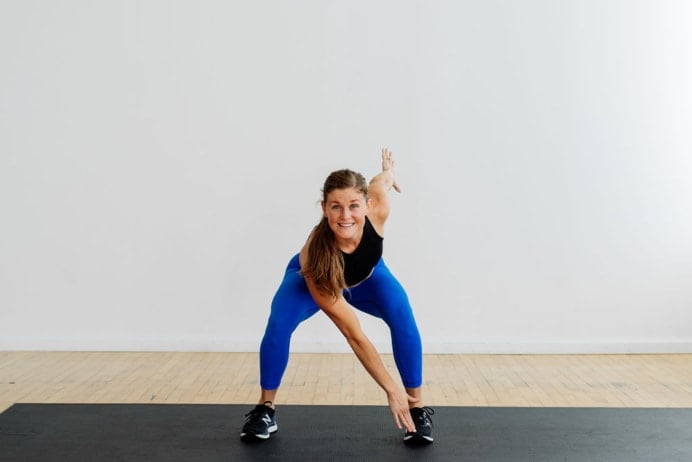
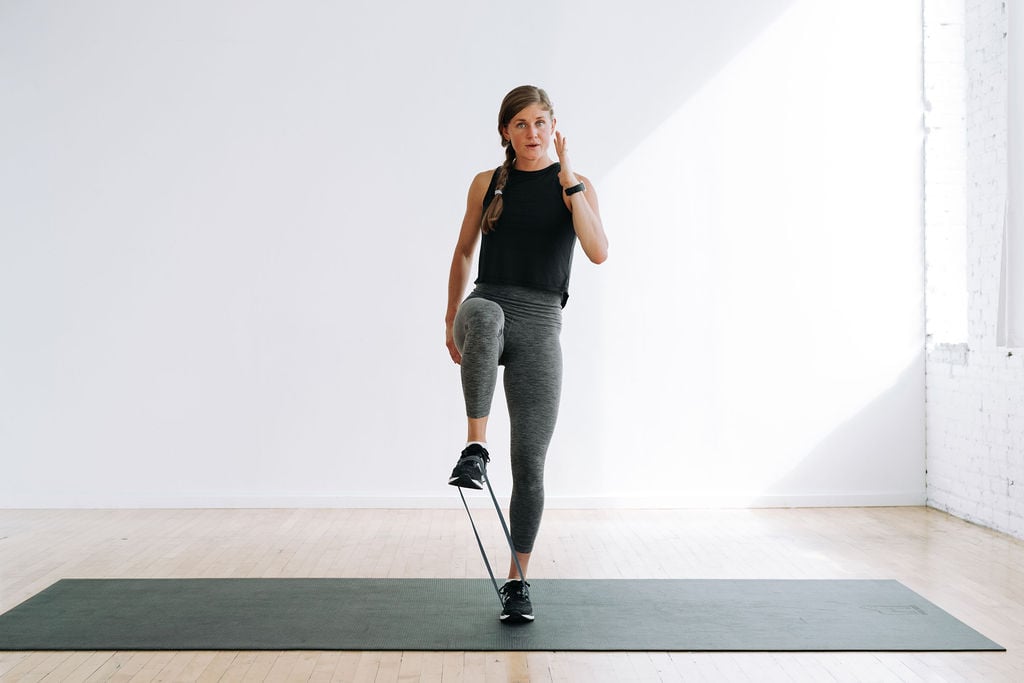
10 Best Glute Activation Exercises (10-Minute Glute Warm Up with Mini Band)
Activate the muscles in the legs and butt with these 10 glute activation exercises. If you struggle to feel your glutes “turn on” during lower body workouts, this workout is for you. Use this guided, 10-minute glute activation workout as a warm up before your next leg day or run.
These 10 banded glute activation exercises are designed to “turn on” your glute muscles — no lunges and no jumping.
Use this lower body warm up routine before a leg workout, as a pre-run warm up (glutes and hips are so important for runners), or as a standalone 10-minute workout.
This is a great workout to add to your beginner fitness routine as it will challenge you to make the mind-muscle connection needed to activate the glutes.
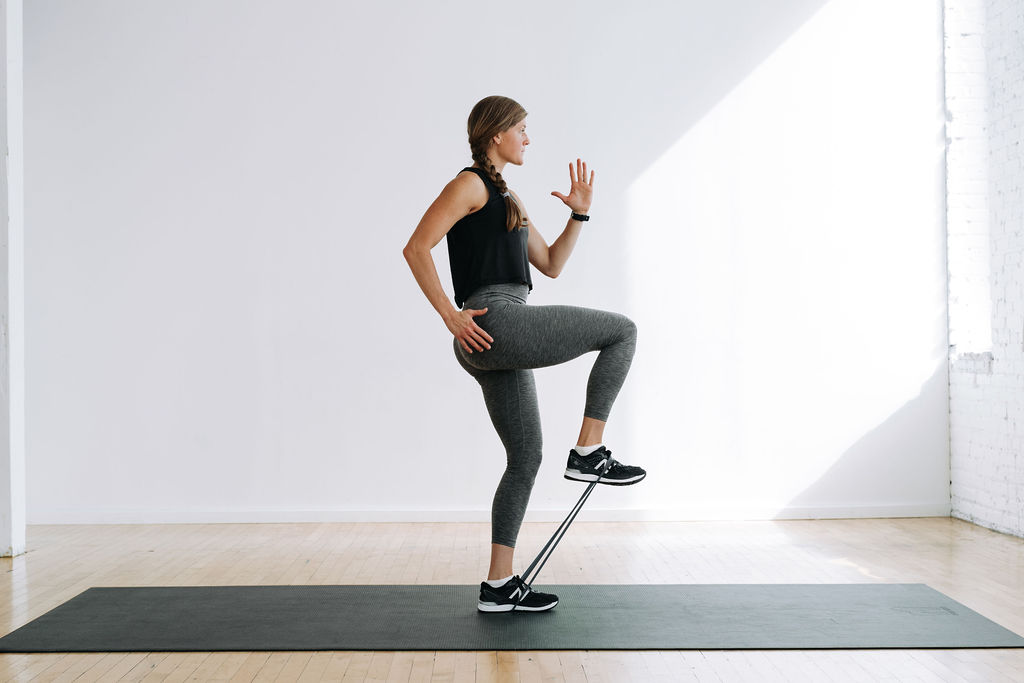
Glute Activation Exercises FAQs
Glute activation is a series of warm-up exercises used to properly ‘turn on’ the muscles in your butt. Glute activation is useful because we have several big muscles in our lower body, like the quads and hamstrings, that sometimes overpower the glute muscles (which can lead to muscular imbalances, low back pain and injury). Glute activation exercises get blood flowing to the glute muscles and prepare them for work. Find another 10-Minute Warm Up Routine here.
The best glute activation exercises focus on a variety of movement patterns based in your hips. Banded squats, hip hinges and glute bridges are some of my favorite glute activation exercises. I like to use resistance bands (aka booty bands) for glute activation. Banded glute exercises isolate and target (and thus activate) the smaller glute muscles.
These glute activation exercises are beneficial for those who struggle with tight hip flexors or lower back pain during and/or after leg workouts. They’re also great if you have a hard time feeling your glutes “turn on” during lower body exercises and want to build a booty at home.
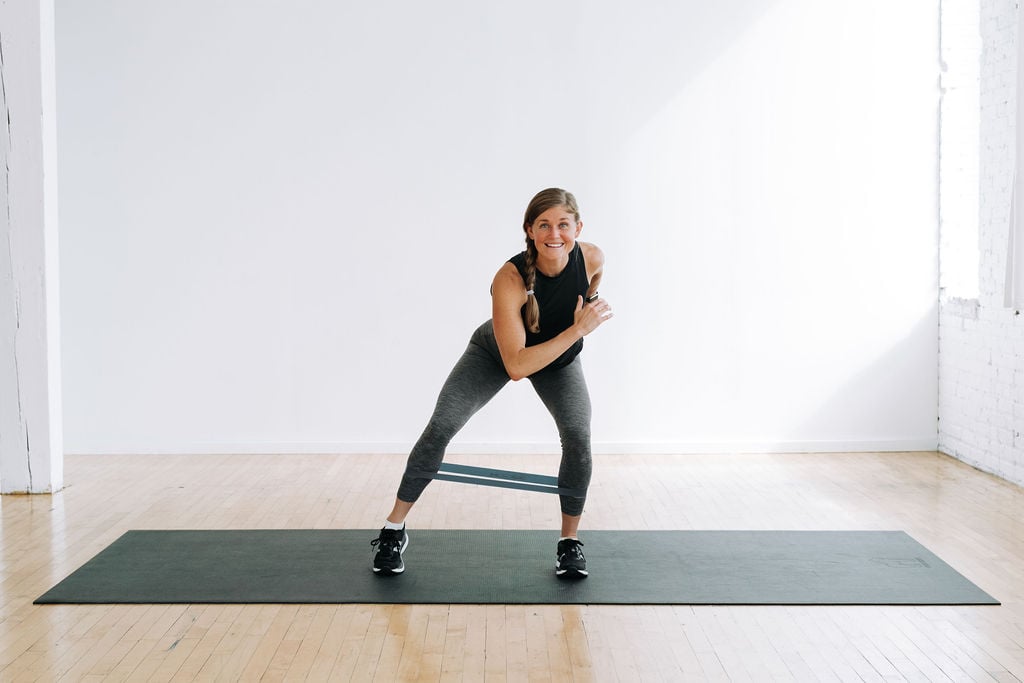
10-Minute Glute Activation Workout
Use these glute activation exercises to “fire up” (or activate) all 3 parts of the glutes:
- The Gluteus Maximus (the main muscle in your butt)
- Gluteus Medius
- Gluteus Minimus
These 10 glute exercises use a mini band to keep constant tension on your glutes, which helps to boost your ability to perform everything from squats to box jumps, running and sprints.
I suggest adding these glute activation exercises to your leg day workout (as your warm up).
Workout Equipment:
Mini Loop Resistance Band (discount code: NML). I’m using a light-to-medium resistance band in this band workout.
Shop My Resistance Bands

Workout Instructions:
Follow along with the guided Glute Activation Workout Video on YouTube, led by certified personal trainer Lindsey Bomgren.
Your Workout Looks Like This:
- 10 Glute Activation Exercises
- Timed Intervals (40 seconds of work per exercise, 20 second rest between exercises)
- Complete All 10 exercises x1 Set
Workout Outline
- Banded Squats
- Banded Single Leg Abduction, R
- Banded Single Leg Abduction, L
- Banded Side-to-Side Squats
- Banded Squat and Knee Drive, R
- Banded Squat and Knee Drive, L
- Banded Hip Hinge
- Banded Kickbacks
- Banded Monster Walk (Frontal Plane)
- Banded Monster Walk or V-Walk (Sagittal Plane)
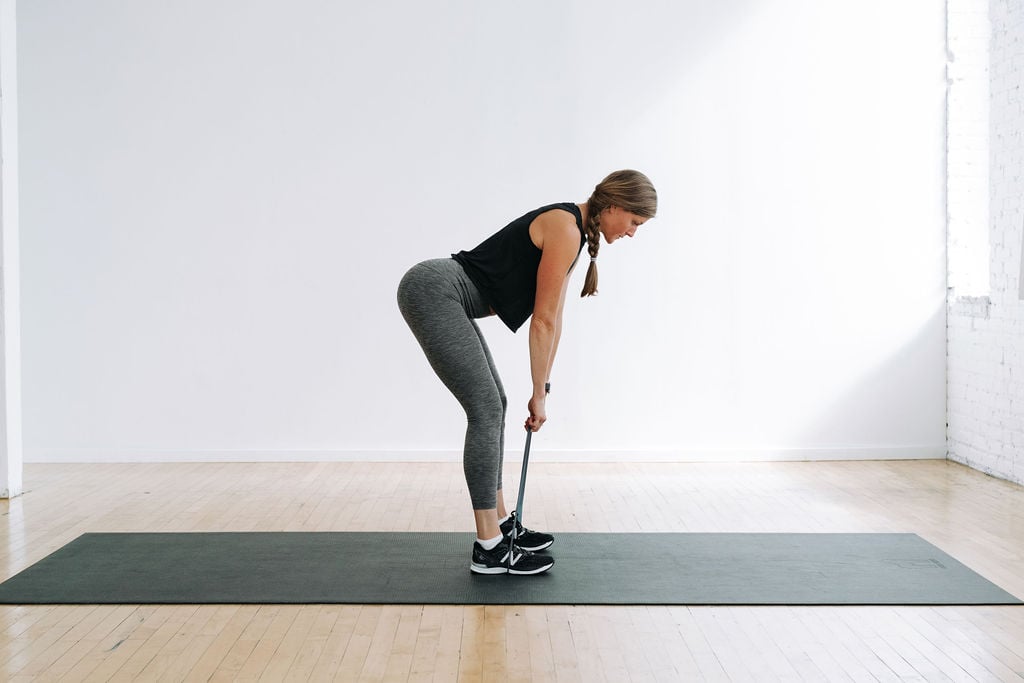
Prefer to Watch On YouTube?
8 Best Glute Activation Exercises
Banded Squats
Targets: Gluteus medius, hip abductors and quadriceps.
If you want better squat form, do these banded squats! The band forces you to open up your hips, which allows you to go deeper into a squat position without rounding your back.
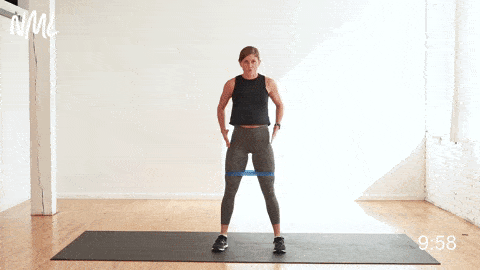
How To Do Banded Squats
- Place the resistance band on your thighs, approximately six inches above the knees. Stand with your feet slightly wider than your hips to create tension across the band (activating your glutes).
- Sit back into a squat, lowering your hips until they are parallel to the knees, striving for a 90-degree angle. Drop your hips down, weight in heels, chest up.
- Then, drive through your heels to return to a standing position. Squeeze the glutes at the top.
Banded Single Leg Hip Abduction
Targets: The hip abductor muscles including the gluteus medius, gluteus minimus, and tensor fasciae latae (TFL). Also know as your outer glutes.
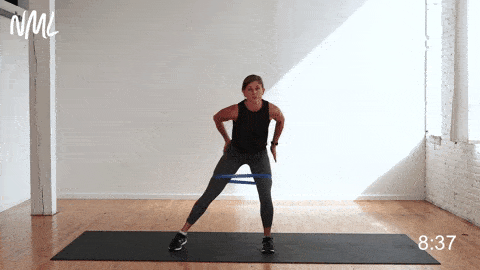
How To Do A Banded Single Leg Abduction
- Place the resistance band on your thighs, approximately six inches above the knees. Stand with your feet slightly wider than your hips to create tension across the band (activating your glutes).
- With knees bent, place 80% of your bodyweight in your right leg, and 20% of your bodyweight in your left toe.
- Step your left leg out, driving through the left glute to stretch the band as far as you can. Tap your left foot to the side.
- Then step your left foot back in to center, keeping your feet slightly wider than your hips to keep tension across the band.
- Repeat this sequence, balancing on your right leg while stepping the left foot out and back for the timed interval.
Banded Side-to-Side Squats
Targets: Gluteus medius, hip abductors and quadriceps.
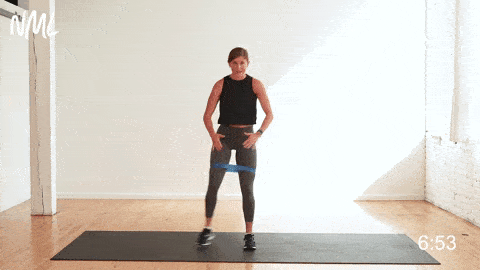
How To Do Banded Side-to-Side Squats
- Place the resistance band on your thighs, approximately six inches above the knees. Stand with your feet slightly wider than your hips to create tension across the band.
- Step your right foot out, stretching the band as far as you can.
- As you step out, sit back into a squat, lowering your hips parallel to knees. Drop your hips down, weight in heels, chest up.
- Hold this squat position for a second, then drive through your heels and step back to center to return to a standing position.
Banded Squat And Knee Drive
Targets: Gluteus medius, hip abductors, quadriceps, hips and hip flexors.
A great warm up exercise for runners to activate the hip flexors.
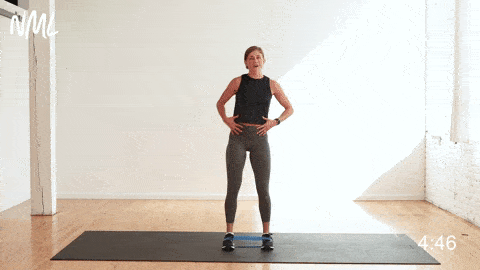
How To Do A Banded Squat And Knee Drive
- Loop the resistance band around the arches of both feet (around soles of shoes). Begin standing with feet shoulder-width distance apart.
- Step your left foot out wide, stretching the band as far as you can. As you step out, sit back into a squat, lowering your hips parallel to the knees.
- Hold this loaded squat position as you step your left foot in slightly. You should now be in a narrow squat position. Tension is still on the band.
- As you drive through the right heel to stand tall, perform a knee drive with the left leg. Drive your left knee up, activating the hip flexor to stretch the band as far as you can (until left knee is inline with left hip).
- Lower your left leg back down to return to the starting position.
Banded Hip Hinge (Deadlift)
Targets: Hip extension, gluteus maximus, hamstring muscles and lower back muscles.
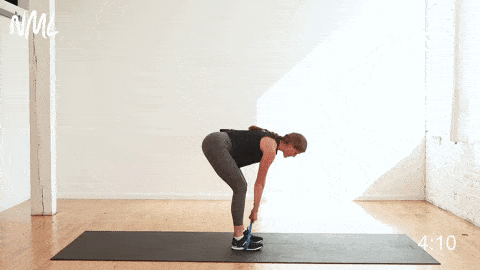
How To Do A Banded Hip Hinge Or Banded Deadlift
- Loop the resistance band around the arches of both feet. Begin standing feet hip-width distance apart.
- Grab on to the top of the band with both hands and stand up, stretching the band.
- With a soft bend in the knees, hinge at your hips to slide your hands down the front of your legs. Think about pushing your hips back behind you like you would for a deadlift.
- Hinge until you feel a stretch in the back of your legs (hamstring muscles).
- Then drive through your heels to stand up, pulling the band to create tension. Return to the starting position.
Banded Kickbacks (Glute Kickbacks or Donkey Kicks)
Targets: All three gluteal muscles — the gluteus maximus, medius, and minimus, as well as the hamstrings, spine and back (entire posterior chain or backside of body).
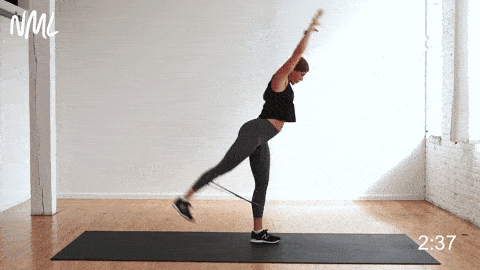
How To Do Banded Kickbacks
- Place the resistance band around the shin/calf area, approximately six inches below the knees. Begin standing feet hip-width apart, slight bend in the knees.
- Sit back into a narrow squat, lowering your hips parallel to knees.
- Drive through your heels to stand tall. As you do so, kick your right leg back behind you, stretching the band as far as you can. Drive your arms overhead to increase engagement along the entire backside of the body.
- Bring your right leg back to center and sit back into a narrow squat.
- As you drive through your heels to stand tall again, kick your left leg back behind you, stretching the band as far as you can. Drive your arms overhead.
- Repeat this sequence for the timed interval, alternating the leg that kicks back.
Banded Monster Walk
Targets: The glutes and hips (specifically the gluteus medius).
A great exercise for hip stability. Your hips support your pelvic floor, so building hip strength is important for a stable pelvic floor.
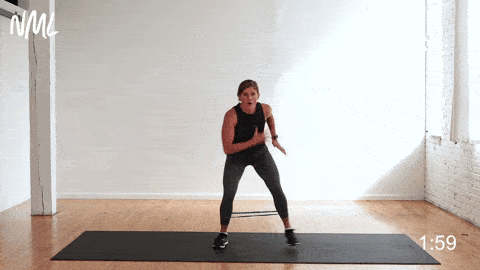
How To Do A Banded Monster Walk
- Place the resistance band on the shin/calf area, approximately six inches below the knees. Stand with your feet slightly wider than your hips to create tension across the band.
- Bend at the knees to find a loaded squat position.
- Step your right foot out wide to stretch the band and create tension.
- Then, step your left foot out wide to stretch the band and create more tension.
- Step your right foot in, then step your left foot in to find a loaded narrow squat position.
- Think: wide, wide, narrow, narrow. Repeat this sequence for the timed interval.
Banded Monster Walk Or V-Walk
Targets: The hips, hip flexors, gluteus medius, quads and hamstrings.
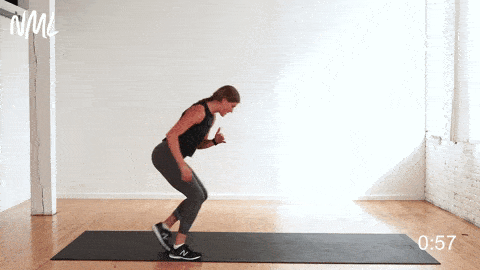
How To Do A Banded Monster Walk Or V-Walk
- Place the resistance band on the shin/calf area, approximately six inches below the knees. Stand with your feet slightly wider than your hips to create tension across the band.
- Bend at the knees to find a loaded squat position.
- Take a step forward, stepping your right foot out wide in front of you to stretch the band and create tension.
- Then, take another step forward, stepping your left foot out wide to stretch the band and create more tension.
- Take another step forward with your right foot and another step forward with your left foot, keeping constant tension on the band.
- Then, reverse your direction taking steps back. Step wide each time, keeping constant tension on the band.
- Think of stepping as wide as your yoga mat. Repeat this front/back movement for the timed interval.
More Workouts
Lower Body WorkoutsPin this 10-Minute Glute Activation Workout
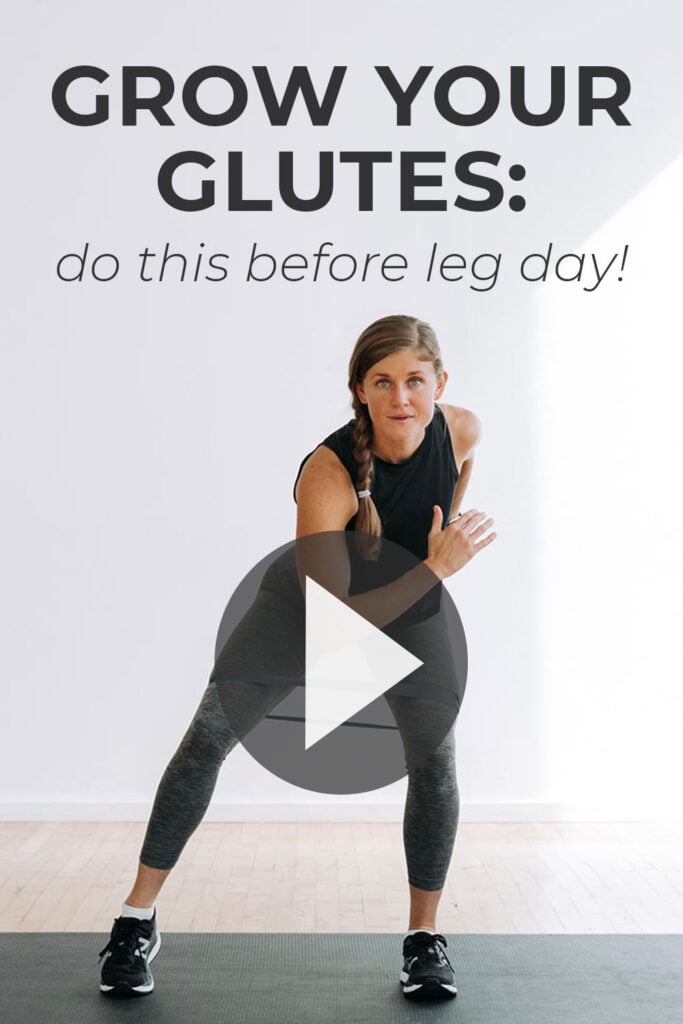
This post includes affiliate links. I do make a small commission for products purchased using these links (at no additional cost to you). Thank you for supporting Nourish Move Love, making the content you see on this blog possible.










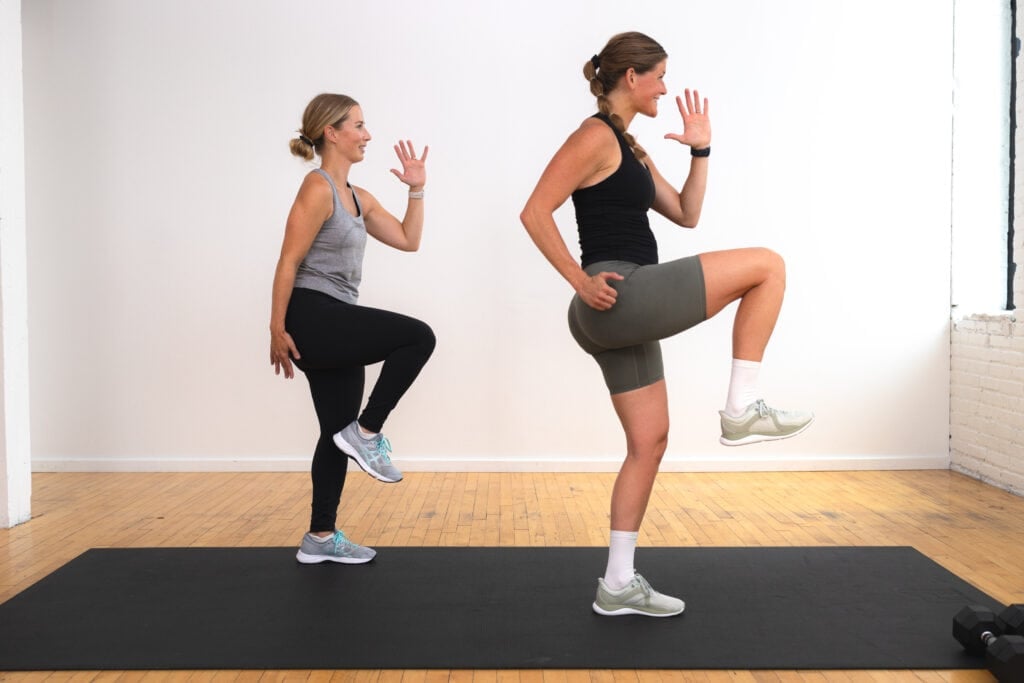
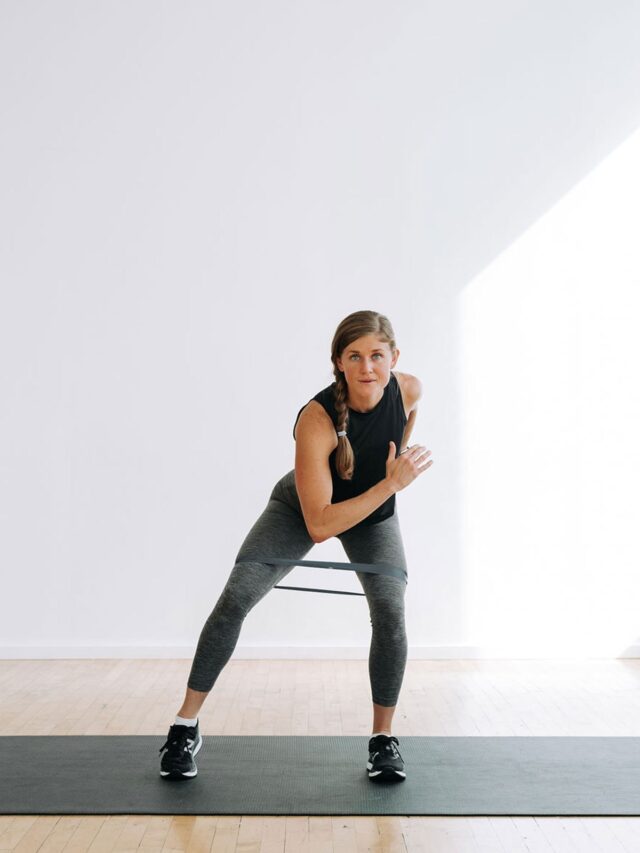
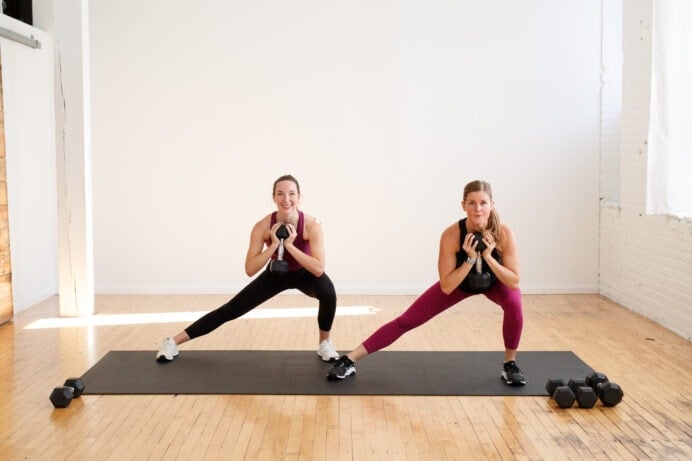
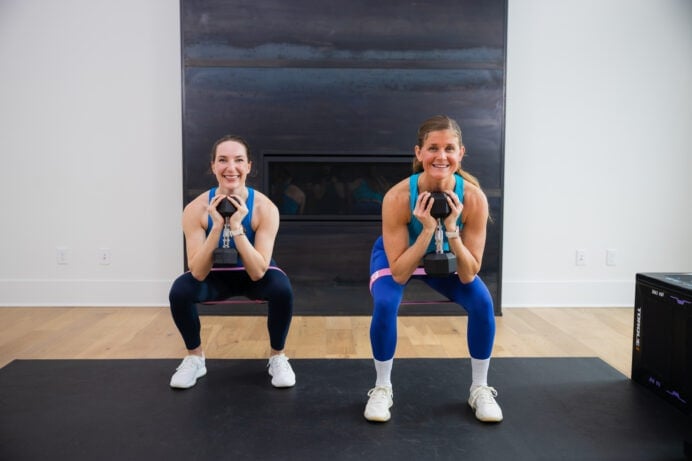
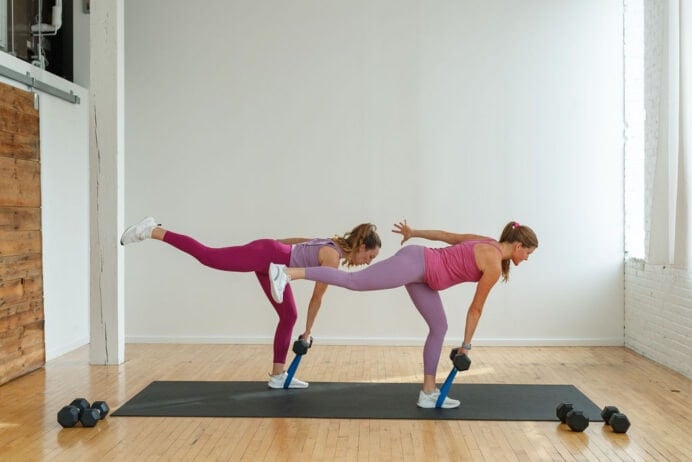
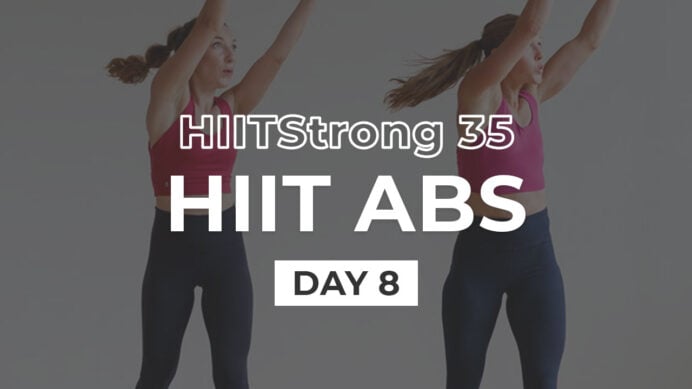
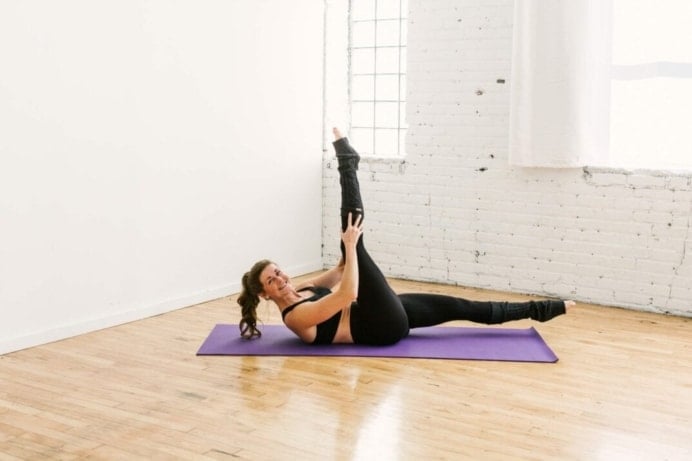
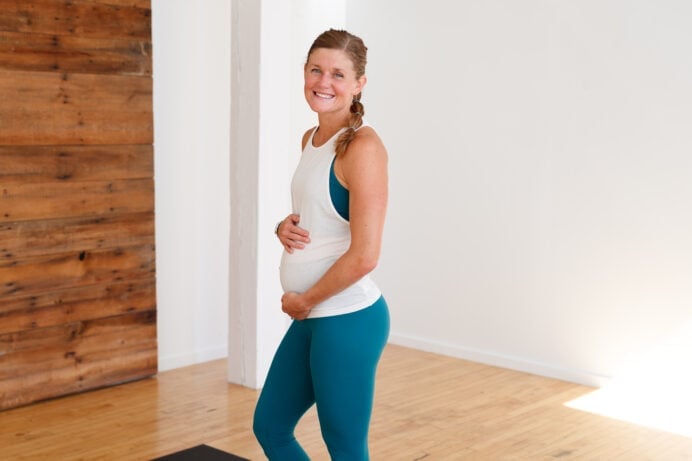
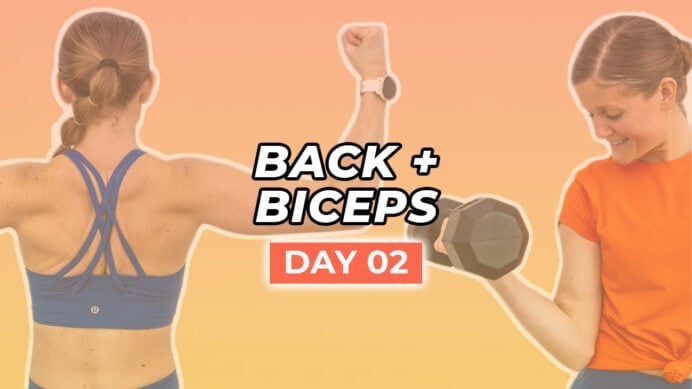
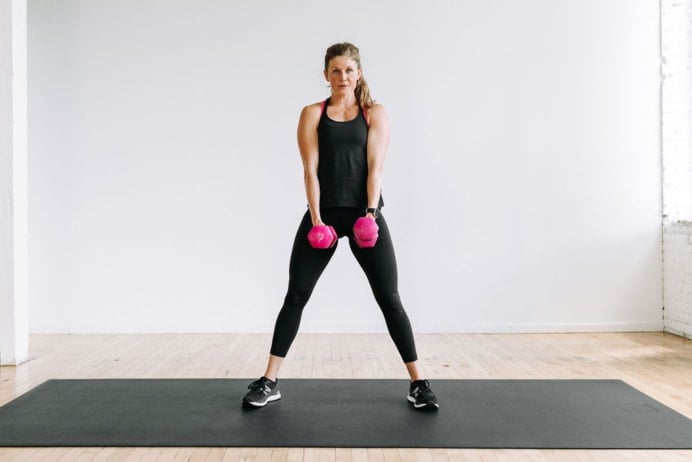

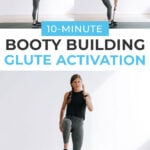






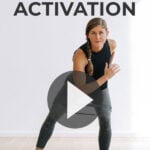
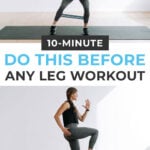
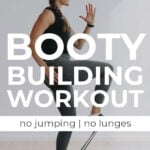


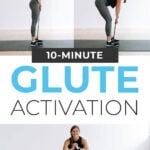

Hi, my quads turn on instead of my glute (one leg only) when I try to do many of these exercises. I am trying to get glute activation working to stop chronic knee pain (same one leg) when running. Whats your advice for approaching these exercises and getting the quad to switch off? Annie
Hi Annie! Great question I would start with a simple glute activation exercise first to get the glutes firing — lie on your side with your back against the wall (glute that’s having trouble firing up), from there press the heel of your foot into the wall and raise your leg drawing small half circles up and down the wall with your heel. This should get that glute firing. Once you have the glute active then start this routine! Also placing the resistance band around the soles of your shoes (bottom of feet) and doing side to side walks is a great way to get those glutes firing (band around feet vs thighs). I hope that helps! -Lindsey
Love this thanks!
Ira! So glad you loved this mini band glute activation workout! Thanks for giving it a try, and I hope you come back for more! -Lindsey